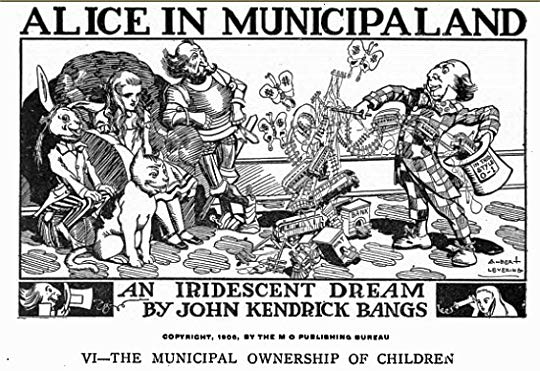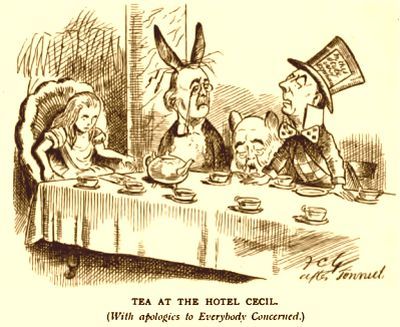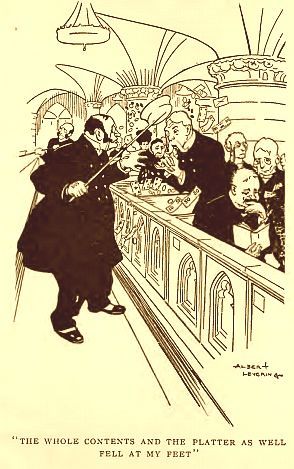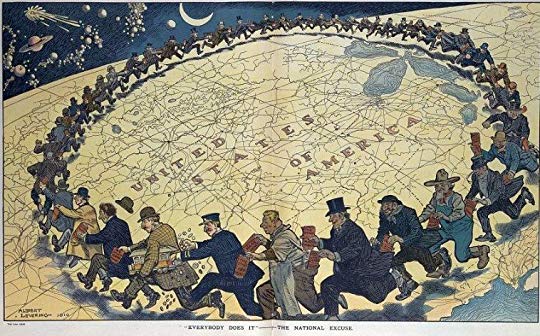You see, Miss Alice, I made a personal study of collisions. The Mayor here ordered a fresh one every day for me to investigate, and I noticed that whenever two cars bunged into each other it was always at the ends and never in the middle. The conclusion was inevitable. The ends being the venerable spot, abolish them.
– Mad Hatter to Alice from ‘Alice in Blunderland’
Through the novel Alice in Blunderland: An Iridescent Dream, – a spoof of the two Alice books by Lewis Carroll, Alice’s Adventures in Wonderland and Through the Looking-Glass.- John Kendrick Bangs narrates the inner workings of an eccentric political machinery, that even the modern reader will immediately recognize. A sharp political satire, first published in book form in 1907 by Doubleday, Page & Co. of New York, the narrative is a parody detailing corporate greed, state policy bloopers and overall government incompetence told in a tongue-in-cheek manner.
Even though the novel is more than 110 years old, the scenarios that it depicts are still fresh & relevant today. It takes no effort for the reader to discover and connect with the world, The Blunderland, that the author describes in the novel; the land described as the Municipal Ownership Country, were the government controls all the aspects of the people’s life; all the reader has to do is to look around.
Using absorbing scenarios, Bangs makes keen observations about political and economic issues like corruption, backhanders, centralization of power, corporate gluttony, exorbitant taxes, political patronage and gross incompetence of the people who are entrusted with running the various spokes of the government system, within his narrative.
In the parody, we meet Alice, who has ended up in a strange city named Blunderland, a city founded by the Mad Hatter, the March Hare, and the White Knight, and a city with a political system that will delight us with its eccentric policies, bizarre laws and strange characters. Grand but impractical facilities that she meet there, like the train that goes everywhere yet nowhere and the aromatic gas plant and economic policies like the issue of Municipal Bonds to cover every expenditure, inexplicable laws like the Municipal Ownership of Teeth, are all fine examples of the incompetence, hassles of red tape and downright stupid policies that we are so familiar with, in our modern day political environments.
A few so called experts and policymakers coming up with gargantuan and ostentatious projects, all in the name of development, safety and comfort for the general public; projects and undertakings with no real-world benefits; still cheered on, clapped and praised by cronies blinded by nepotism, political patronage and shameful fandom towards those who rule and make stupid policies are just the same today as it was during the author’s time period.

“The only way that I can find
To stop this car colliding stunt
Is cutting off the end behind
And likewise that in front.”
One of such grand schemes that Alice visits in the city of Blunderland is the Municipal Ownership Circulating Railroad, a circular train that stops everywhere; a big circular car that runs all around the city and joins itself where it began in the beginning; a train built on a solid foundation and one that doesn’t move an inch; a train that was invented after much research, brainstorming and policy making, as a solution for cutting down on accidents caused due to collisions between railroad cars.
“Yes, but if they don’t go – how does anybody get anywhere?” asked Alice.
“They can get off and walk,” said the Hatter. “And it’s a great deal less dangerous getting off a train that doesn’t move than off one that does… …we M. O. people are after the comfort and safety of the people first, last and all the time.”
The narrative by Bangs, detailing the invention of the circular railroad by the state of Blunderland, is loaded with sharp sarcasm.
The novel was originally published serially in the magazine Concerning Municipal Ownership – a magazine published by the M O Publishing Bureau, New York – from December 1906 (Vol-1, Issue-10) to May 1907 (Vol-2, Issue-5), with the title Alice in Municipaland. The novel, which was published in parts in the magazine, was accompanied by fascinating line drawings from the American illustrator Albert Levering. When the novel was published as a book in 1907 by Doubleday, Page & Co. of New York, these illustrations by Levering was also included.

Going through the 1906 and 1907 issues of the ‘Concerning Municipal Ownership’ magazine, I found that the original magazine piece had a total of six chapters, while the novel that got published in 1907 in book format had an additional chapter titled ‘ The Department of Public Verse ’, which presumably was added by Bangs at a later stage. After publishing the final chapter of the novel in the May 1907 issue of the magazine, it seems that Bangs also contributed a column titled Muncipalunancy in the June, July and August 1907 issues of the ‘Concerning Municipal Ownership’.
More Political Satires based on the Adventures of Alice by Lewis Carroll
Alice’s Adventures in Wonderland and Through the Looking-Glass, the two Alice books by Lewis Carroll, has been used as a base for a number of political parodies. The Westminster Alice, which came out in 1902, is a collection of vignettes by Saki, criticizing the politics of Britain and features many prominent British politicians of that period.

Clara in Blunderland, a novel written by Edward Harold Begbie, J. Stafford Ransome and M. H. Temple under the pseudonym Caroline Lewis , and published by William Heinemann of London in 1902, is another political parody, which takes a critical look at the British Governments involvement in the Second Boer War. Lost in Blunderland: The Further Adventures of Clara, also written under the pseudonym Caroline Lewis , and published in 1903, criticizes the early administration of Prime Minister Arthur Balfour.
Adventures in Fiscal Wonderland, by John Bull, which was published in 1904, endeavors at understanding the economic state of England. Alice in Delighted States by Edward Hope, which came out in 1928, is another parody of the socio-political eccentricities, based on Carroll’s tales.
Alice In Blunderland – A Comic Book with the same title

In 1952, a promotional comic book titled Alice In Blunderland – A Fantasy For Every American Citizen came out as a tool in raising the awareness in public about wasteful federal expenditures and about government inefficiency.

The comics was an attempt at unraveling the mayhem and staggering cost associated with the federal functioning through cartoon panels.
Albert Levering – The illustrator
The illustrations – for both the magazine piece and the first edition book, – which accompanied Alice in Blunderland were done by the American illustrator Albert Levering (1869-1929).

Albert Levering was the illustrator for other works from Bangs like Jack and the Check Book, Mrs. Raffles: Being the Adventures of an Amateur Crackswoman and Mollie and the Unwiseman.
He was also famous for his ”Everybody does it” – The national excuse, illustration done in 1910, which depicts a large circle of men, from various professions , marching around a large map with the label The United States of America, while each taking money from the pocket of the man in front of him. The illustration, which was done for the Puck magazine, symbolizes the avarice in the society and the evil connection between money and politics.

Albert Levering passed away on 12 April 1929.
An interesting political parody
Alice in Blunderland: An Iridescent Dream is not a novel that will make you laugh out loud, as the humor can be a bit wry, but it is still an interesting political parody, which is fresh, funny and highly relevant.
Written By : Pramod S Nair





